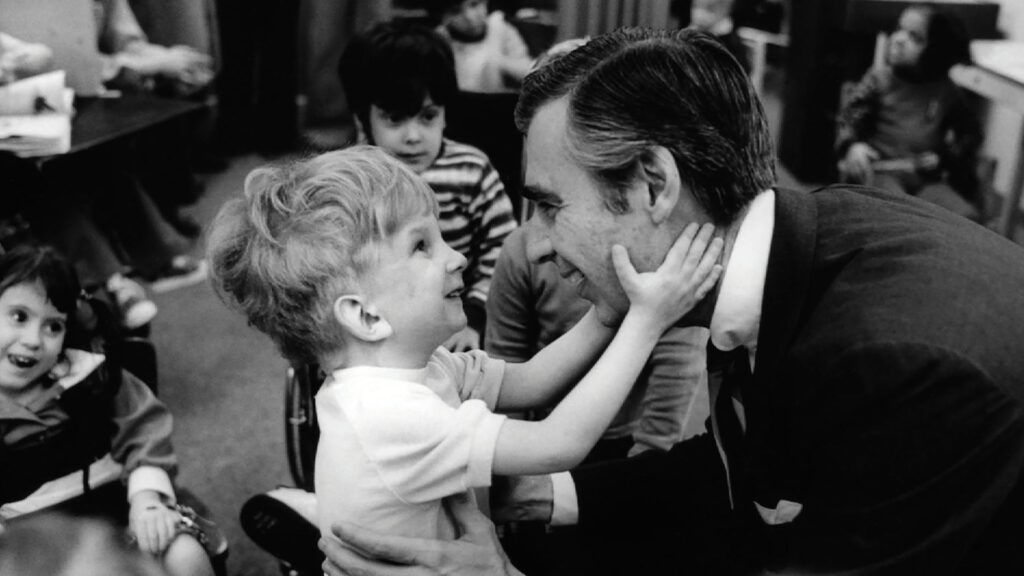Many people who never knew Fred Rogers still fondly remember the star of the beloved PBS show Mister Rogers’ Neighborhood as their friendly neighbor. But Reverend George Wirth called him something else: friend.
Wirth is one of the lucky few who knew Rogers best and appears in a new documentary about the icon, Won’t You Be My Neighbor, slated to arrive on June 8th, marking the 50th anniversary of Mister Rogers’ Neighborhood this year.
Wirth’s involvement in the documentary is the first time the reverend has spoken publicly about his friendship with Rogers. With the film scheduled for release this summer and a biopic starring Tom Hanks already in the works, the minister felt it was time to honor his friend by helping others get to know him.
The minister met Rogers in Pittsburgh in 1983, at a funeral, Wirth tells Guideposts.org. A close friend of Wirth’s had passed away from a heart attack and Wirth said a prayer during the service. Rogers — who also knew Wirth’s friend — was sitting in the back row.
“After the service was over, I got a call out of the blue from Fred Rogers, who said, ‘I was there at the memorial service. I heard your prayer. It’s obvious that you cared about your friend very much, and I wonder if you’d be available to just get together and talk sometime,’” Wirth says.
The next day the two had lunch and embarked on what would become a 20-year friendship.
“We shed some tears about different things in our lives, and he said to me, ‘George, I know you’re missing your friend, but I think I could be your friend, too,’” Wirth recalls.
Most people wouldn’t reach out to a stranger like that – Wirth says he and Rogers had met only once before their lunch together, both ministers in the area with an overlapping social circle — but then, most people weren’t Fred Rogers.
“The thing that was amazing about Fred, amongst so many other things, was he was caring, and compassionate, and very perceptive about what other people were feeling,” Wirth explains. “He had almost a radar to sense when a person really needed a special touch, or a special word of embrace, or a welcome. He had a gift for that, and he did it with all the people through the television screen, children and adults, but he also knew how to do it one by one. When you were with him, he was a good listener, and it would be a matter of just minutes before you would be the only person in the world talking to Fred Rogers.”
Before dying from stomach cancer in 2003, Rogers left his mark on the world, becoming a friendly face on the TV screen, fighting for funding for the arts on Capitol Hill, and making use of those one-on-one interactions with fans. The ordained minister-turned-TV personality had a gift for connecting with others, regardless of race, socioeconomic background, religion, or gender. According to Wirth, it was all part of the man’s ministry.
“That’s what he envisioned the neighborhood and all the other special programs that he did, the books that he wrote. He viewed it as his ministry,” Wirth says. “His goal above everything else was to help people learn about each other, actually come to know and love one another, and cross over all the barriers that we put up to prevent that. I think he saw his life as helping people come to know each other as neighbors and friends at a deeper level.”
Wirth says it was Rogers’ faith that pushed him to tackle tough topics on the show and to reach out to those who believed and lived differently from him.
“Fred was a deeply spiritual person who prayed every morning and evening, who studied the Bible, and who read a great deal of literature by people, not only Christian authors, but people of other faith traditions,” Wirth explains. “He was very open to other faiths. He, as a spiritual person, [believed], as in his Christian faith, [that] God became incarnate, became human, and lived among us; that that was our calling, to be an incarnation of one to another. To hug each other, to talk with each other, to listen together, to encounter other people, and treat them, as I said before, with civility, respect. He had an aversion to people who disrespected other people, who treated other people in an unkind way, who bullied people.”
Rogers’ heart, the revolutionary way he used his TV series and his tireless crusade to introduce children to the arts are all on display in Won’t You Be My Neighbor. Rogers’ goal with his ministry was to open people’s minds and introduce them to new cultures, people, and ways of thinking and loving.
“Hopefully this [documentary] will bring a renewed [sense] of what it means to respect, and care about, and be compassionate toward other people,” Wirth says of the film.
“We’re living in a time in America now when just the opposite undercurrents are running through this country. There seems to be more unkindness and less respect and a lack of civility, and I think it’s almost natural for us to reach back to Fred Rogers and what he did with his television ministry, and how he lived his life, and realize that we need that kind of person, those kinds of people today to get us moving back in the right direction.”






